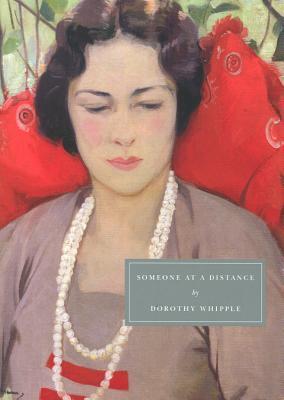Someone at a Distance is a heartbreaking story of an ordinary upper middle class British family is so gripping. I have read no other work by Dorothy Whipple, so am not aware of her style of narrative. I enjoyed this from a literary point of view, but I found the book oddly regressive to feminism.
 Let me start with the plot, which, as the blurb shows, is ‘deceptively simple’. The Norths are a happy, self-contained family of five. There is the mother, Mrs. North, and her prodigal son Avery who is married to Ellen. Avery and Ellen have the two perfect children, Anne and Hugh. Everyone loves each other as much as expected in a reasonable family. Ellen and Avery have the perfect marriage till Mrs. North’s French companion, Louise Lanier, comes along and strategically wins over the hearts of Mrs. North and then her son. The story follows the aftermath of the discovery of the affair between Avery and Louise and how it tears apart a happy family.
Let me start with the plot, which, as the blurb shows, is ‘deceptively simple’. The Norths are a happy, self-contained family of five. There is the mother, Mrs. North, and her prodigal son Avery who is married to Ellen. Avery and Ellen have the two perfect children, Anne and Hugh. Everyone loves each other as much as expected in a reasonable family. Ellen and Avery have the perfect marriage till Mrs. North’s French companion, Louise Lanier, comes along and strategically wins over the hearts of Mrs. North and then her son. The story follows the aftermath of the discovery of the affair between Avery and Louise and how it tears apart a happy family.
Whipple’s world is heavily character driven. The prose is not spent on describing places or situations. Instead, it’s all about the people. She puts these fictional people in these actual situations and beautifully describes their thoughts, their insecurities and their reactions.
I think one of the more interesting things about this novel is that there is no clear protagonist. You might think it’s Ellen, she is definitely the good to Louise’s evil, but I feel Louis is as much the heroine of the book. Louise may be a cold-hearted person and her behavior is not justifiable, but she knows what she has wanted for a very long time and she has worked towards it. A lot of her behavior is also driven by her rejection of her first love. She comes from a small provincial family and it is the fate of her lot to be more practical than logical. With that context, you appreciate the economic sense that she applies when she systematically goes through Mrs. North’s belongings and determines what can kept or discarded. Her behavior towards Hugh and then towards Avery are just actions of a desperate yet calculating woman who needs to create her future. Even though Louis appears to be quite cold and independent, all her life plans are around setting down with a man and getting his attention. It is the 1900s, she can work if she wants. What I truly find unpardonable in her is the way she treats her parents and holds them ransom to her affections.
Ellen is the “virtuous” woman in the novel and I wish my heart bled for her, but it does not. She belongs to the generation of a woman who missed the whole “feminism” boat. These are the women who got married young and whose entire lives revolved around their husband and kids. These are the woman who assumed that because their family was the center of their universe, the sentiment would be reciprocated, which in quite a few cases was not. Ellen should have listened when Louise warned her to take care of the way she looked, not that Avery’s straying was justified. Avery should have given honest feedback when Ellen asked for it.
My main issue with the novel was the fact that the whole break-up of the marriage was about protecting Anne, who discovers her father in a compromising position with Louise. I understand Anne was a child who adored her father, and he had a mighty fall from the pedestal, but it seemed ridiculous that the whole discussion about the marriage became about what Anne would think.
Ellen thinks she can forgive Avery and can get back with him, but only after Anne and Hugh are independent. Avery is not worried about Ellen, but about Anne when he later contemplates his mistakes. I get that when marriages fall apart, children get affected, but in this situation, Avery cheated on his wife. All the discussion had to be between him and his wife. His kids want to protect their mother from him, which is natural, but they cannot determine what their parents decide to do. I find this very regressive. I believe children are more accommodating and forgiving than adults. Anne’s entire focus is about her life and about her horse, not about the fact her father has left her mother. I feel Ellen is being marginalized by her own daughter even after her whole life falls apart.
The other thing that I take issue with, was the way which the novel ends. It’s a nice and convenient way to tie up the loose ends with Ellen getting a job with Mrs. Beard at the guest house. People are not that lucky, the war has ended and jobs are not that many.
I think this book can provoke a lot of debate and discussion about each character and their behavior, which probably makes it good reading.


